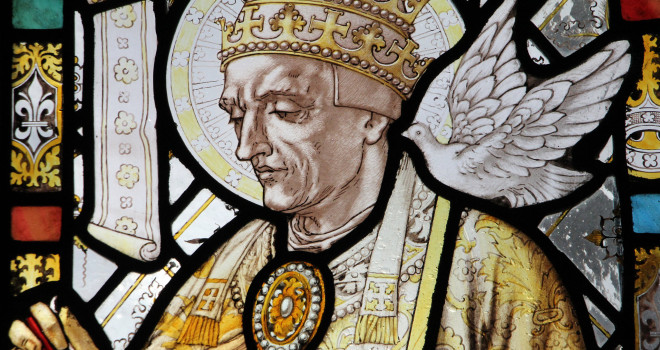|
08 August 2019
Beggar in disguise - Saint Gregory's mysterious visitor:

Pope Gregory I popularly known as Saint Gregory the Great was a great Catholic saint who lived during the period 540-604. The Church honors him with the title Doctor of the Church for his great many contributions to the Church. He is the patron saint for musicians, singers, teachers and students.
Today we look into a mysterious incident in the life of this great saint that re-confirms our belief that we are watched over and guided by our guardian angel at all times.
Saint Gregory belonged to a wealthy family in Rome. After his father’s death, he converted their family villa into a monastery dedicated to the Apostle Saint Andrew. There he lived a monastic life in the initial years of his vocation by undergoing severe penances and fasts. One evening as Gregory crossed the courtyard on his way to his room, he caught sight of a beggar outside the gate. He was always known to be kind and generous and he approached the man asking him “What brings you here?” The man replied “I have nowhere else to go. I was a merchant by trade, but my goods were lost in a storm at sea. I have not eaten for days.” Saint Gregory was greatly moved on hearing this and gave him the coins he had in his pocket saying “Take this and get what food you can with it. Come back when you run out.” Several months later, the beggar again came to him. He looked even more pitiful this time. He said that the Tiber had overflowed and destroyed the granaries and there was no food in the city. Hearing this, Saint Gregory at once gave the man a basket of bread and vegetables much to the joy of the beggar.
Meanwhile the floods in northern Italy were devastating and plague had begun to hit the region. A week later the beggar again returned and stood outside the gate. On seeing him Gregory thought this man will surely die if he remained in Italy and wondered what he could do to save him. At that moment, he remembered a silver plate that his mother had sent him a few years back and which was the only valuable piece that he possessed. He raced to his room and took the plate and approached the beggar and said “My friend, take this dish. It is good silver and should fetch a fair price.” He also reached into his pockets and gave him the last few coins he had saying “Now, you must leave the city. Trust in God’s goodness, and He will see to your needs.” He felt great joy and confidence that he had helped save the beggar’s life.
A few years later, Saint Gregory was made the sixty third Pope. He performed all his papal duties with utmost diligence and was known for his genius and skills. But what stood out the most was his humility. During his reign as a Pope, he began a practice of inviting twelve poor people into the papal quarters everyday and he would serve them a meal himself, in imitation of the Last Supper. On one particular day, he noticed that there were thirteen guests in the dining area. He asked his steward “why are there thirteen people here today?” But strangely, the steward replied that there were only twelve. Looking around he still could see thirteen guests. As the evening progressed, he became increasingly drawn to one of the guests. Every time he looked at the man, it seemed he was looking into a different face. At times the man would appear to have a young face and at times an old and noble face. He looked familiar too. Finally he approached the man and asked him who he was. The man looked at Gregory and replied “I am the poor merchant to whom you gave twelve pieces of money and the silver dish that held the special memory of your mother. I am your angel, whom God sent to test your charity.”
Gregory began to tremble before the angel of God. The angel then replied “Fear not Gregory. It is because of that silver dish that God has given you the Chair of Peter. As I was the cause of your being raised to that position, so shall I protect and preserve you in it until death. God will grant you everything you ask through me.” Then the angel vanished. Gregory then realised why the steward was not able to see this thirteenth guest. He felt a sense of great joy and relief as though the burden of his papacy was lifted from him. From thereon he went on to accomplish great things. His influence on Christian civilisation and European history in general was so profound as to earn him the titles “The Great” and “Doctor of the Church”.